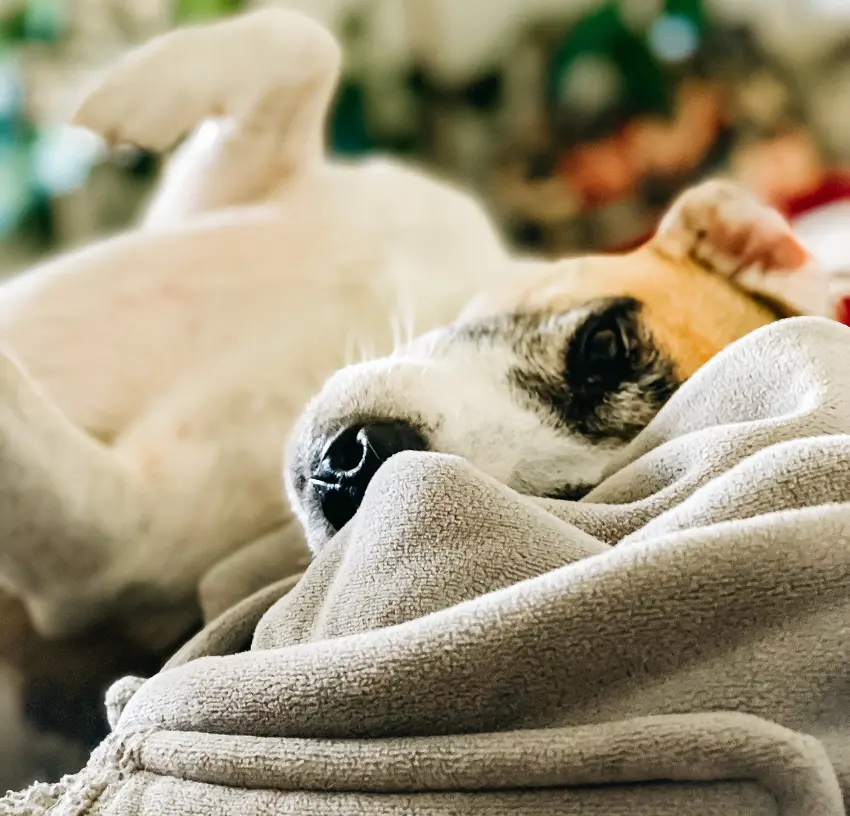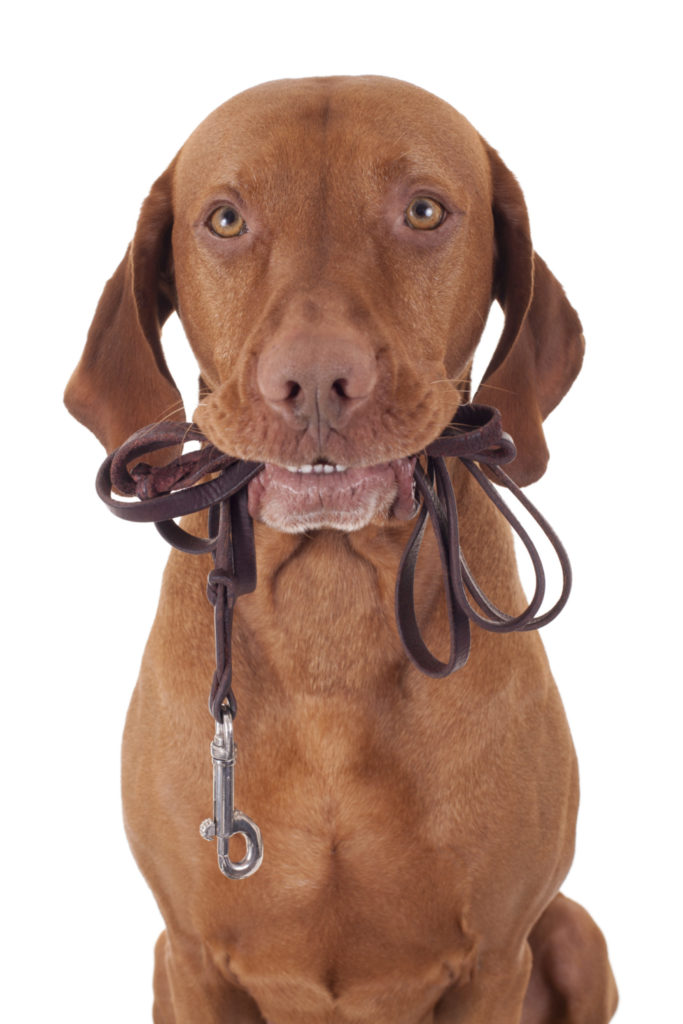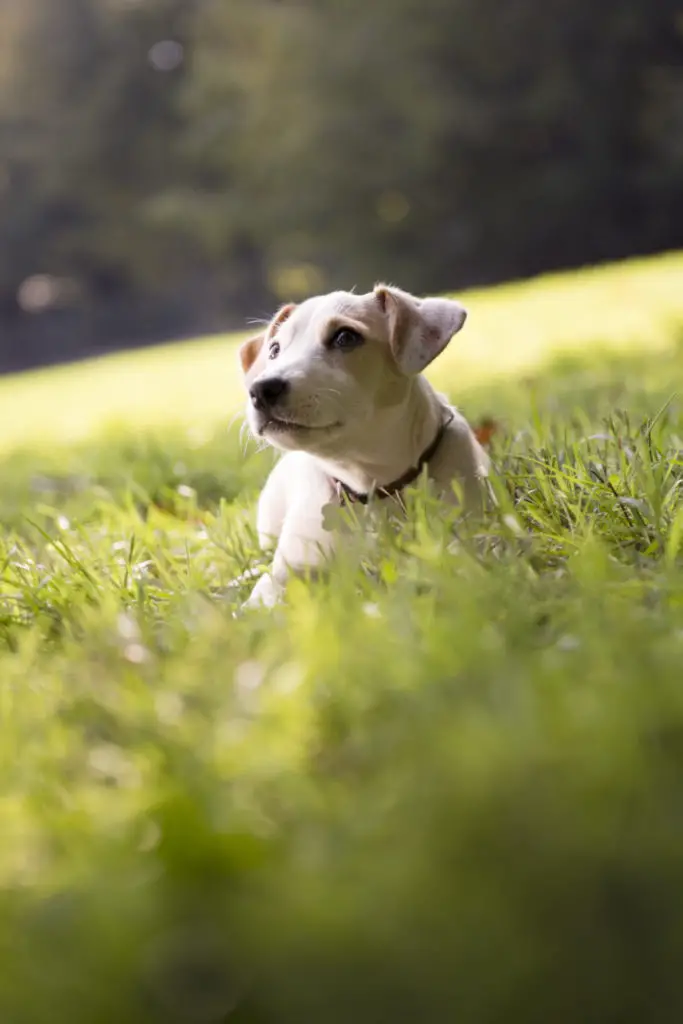Why Does My Dog Poop On My Bed? 5 Possible Reasons
Why does my dog poop on my bed? Some reasons could be fear, showing dominance, poor house training, health problems, or lack of access outdoors. Whatever the reason is, you should fix the behavior so you won’t suffer from soiled sheets and a stinky bed.


As a dog owner, I know very well how easy it is for these pooches to develop a negative behavior. It’s also easy to be annoyed, but I learned over the years that getting to the root of the problem is a much better move.
Reasons why dogs poop on their owners’ bed
The following are some of the possible reasons why your dog is pooping on your bed:
1. Fear
Nervous dogs that get scared easily will literally shit their pants. Loud sounds and other upsetting emotions can lead the pooch to poop. And if it happens to be standing on your bed, your sheets will surely bear the brunt.
Aside from that, dog fights can also trigger a dog to poop accidentally. We’ve experienced this before with our pup Sherlock and our kitten Watson when they had a mini brawl on the bed. Our white sheet turned brown and we have to give both of them an emergency bath.
2. Stress and anxiety
Like fear, anxiety will mess with your dog’s bowel movement. Stressors like being left alone for long hours, the scent of a new dog, the passing of a loved one, and moving to a new home will lead to accidental pooping. This isn’t incontinence, but a case of anxiety. please read here My Dog Cries When He Poops, What Should I Do?

Pooping in your bed in this scenario isn’t your dog’s intention. The stressor is probably stronger while your dog is on your bed. Instead of shouting and punishing the doggo, it’s best to calmly approach your pet.
3. Health problems
If your dog is fully house trained, several health problems might be the reason why the pooch is suddenly pooping on your bed.
Due to chronic irritation along the intestinal tract. Canines that suffer from this condition will have recurring diarrhea and vomiting. Sometimes, diarrhea can be so worse that your dog won’t have the chance to run outside to relieve itself, thus soiling your bed.
Aside from that, geriatric dogs or those older than seven years old will start to have poor control of their bowel movement. Sometimes, the old doggo will eliminate even before it gets out of your bed. This is a normal phase but you should still check with the vet to rule out potential health problems.
Many other health problems will cause your dog to poop on the bed. It’s important to schedule an appointment with the vet to be sure.
4. No access to outdoors
You should also consider the possibility that your dog can’t go outside. You probably locked the door or you’re not around to let them out in time.
Sometimes, dogs will prefer not to go outdoors because of the intense snow or hot sun. With this, the doggo will try to suck it in until they can’t hold on to the poop any longer. Unfortunately, the doggo might let go in the middle of your bed. please read here Why Do Dogs Eat Cat Poop
5. Improper house training
If you’ve recently brought the dog home, you should reassess your house training technique. You probably became too lenient too early and your pooch isn’t properly trained yet. The rule of thumb is that the pooch should pass an entire month without accidents before you stop house training and crate training.

Rushing and ending the house training too early will only lead to problems. Worse, you will have to start over to fix your dog’s habit of pooping on your bed.
Take note that some breeds take more time to be housebroken than other canines. Some of the difficult breeds to house train are Pug, Dachshund, Chow Chow, Basset Hound, Pomeranian, Bulldog, and Jack Russell Terrier. Patience is needed to succeed in training these breeds.
How to stop a dog from pooping on your bed
There’s nothing more maddening than seeing dog poop on your freshly pressed sheets. But instead of losing your sanity, you can do the following so your beddings will be spared next time:
Consult with the veterinarian
If the dog keeps on pooping on your bed, it may be time for visit to the vet. This way, the veterinarian can rule out possible health problems that cause the behavior. This is especially true if your dog is old and experiences diarrhea frequently.
The vet can also propose a treatment plan and other tips to help your dog eliminate on the right spot.
Take the dog out
Not all dogs can open doors and not all of us can install a doggie door. With this, you should schedule your dog’s poop time properly. Make it frequent and scattered throughout the day.
Take note that healthy and young dogs can hold their poo and pee for a maximum of eight hours. However, some can only take it for five to six hours. If you have a senior or sick dog, I suggest taking it out every four hours to eliminate.
For those who are working long hours, it’s best to ask someone to take the dog out for a potty. You can also hire dog sitters who can drop by your home at the time you’ll schedule with them.
Perform proper house training
House training is one of the basic training sessions you have to perform with your dog. You should do this properly and slowly so your doggo can catch up.
A dog crate is very necessary here. Train your dog to sleep in a locked crate at night with its beddings. This is because canines will not soil the spot where they sleep. In the morning, take the dog out and let it eliminate. During morning hours, you should schedule poop time every four hours.
You should be consistent in this process and you should take your dog to the same spot outdoors every single time. This way, the dog will associate that area with elimination. You should also reward them every time they poop in the designated area.
Desensitize your dog to stressors
If the dog poops on your bed when it gets scared or stressed, you should desensitize your pet towards these stimuli. You can do this by associating the stressor with something positive.
For example, if your dog is afraid of the sound of thunder, you can start playing thunder sounds from the web at a very low volume. While doing this, pet your dog and give it some treats. Once your dog is relaxed at a certain volume, try increasing it a bit and see how the pooch will react. Repeat the reward system and work your way from there.
Take note that every dog has a threshold to any stimulus. While you can desensitize them to some extent, don’t expect them to ignore it totally. The goal here is to reduce the dog’s stress.
Why does my dog keep on bringing poop into my bed?
Is your dog giving you poop presents? It’s very rare but some dogs will eliminate properly outdoors then carry their poop through the doggie door by putting it in their mouths or tossing it until it reaches the door.

There’s no solid explanation here, but some dog owners who experienced the same thing say that it’s rooted in the dog’s behavior of giving gifts to their owners. If your pet can’t locate a nice branch or leaf, it will likely just take its poop and bring it to your bed.
However, you should also consider the possibility that your dog is getting your attention by putting its poop on your bed. It’s probably your dog’s way of saying ‘I need to play!’ or ‘I want food!’.
Do dogs poop out of spite?
No, contrary to myths, dogs won’t poop on your bed out of spite. Canines don’t really have an idea of revenge because they are incapable of processing such a complicated emotion.
Most of the time, dogs will experience anxiety pooping if you did something that made them nervous or stressed. This is an unintended response and is usually a secondary result of the emotional turmoil your dog is currently experiencing.
Conclusion
Why does my dog poop on my bed? It could be a case of anxiety, fear, poor house training, or inability to go outdoors. It’s important to look at this problem with a rational mind so you can formulate a fitting solution. If all your efforts aren’t yielding results, you can always consult with a veterinarian or a dog trainer.
